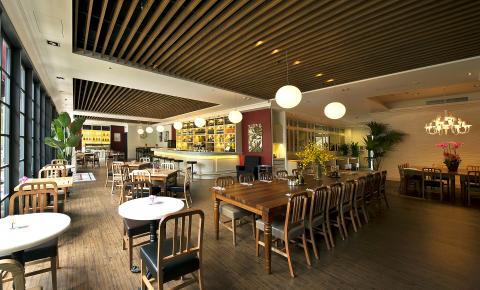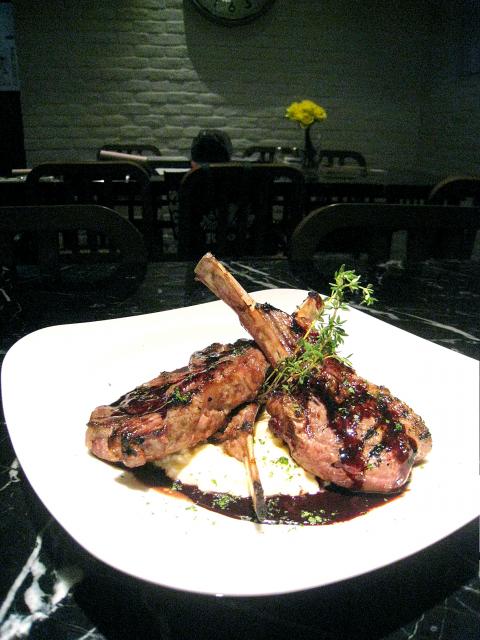Longtable, which has recently opened up in a leafy enclave hidden behind the stern office buildings along Songren Road at the eastern fringe of the Xinyi cinema and shopping district, provides something that is in very short supply in Taipei’s cost-conscious restaurant environment, namely a big, comfortable and airy space to eat and chat.
Walking through the door, this spaciousness is the first thing you notice, quickly followed by the warm tones imparted by an interior decorated mostly in natural wood tones. The high ceiling and the long bar are inviting, though on a fine day, the patio seating, looking onto a paved courtyard overhung with trees, is likely to be in high demand.
The ambiance is somewhere between a fashionable cafe and a bistro. This provides a welcome alternative to the predominantly American diner establishments that dominate in this area. The menu, instead of going for burgers and steaks, offers something a little more European. While aiming for a casual dining experience, Longtable also takes some trouble over providing elegance and refinement at the same time.

Photo courtesy of Longtable
According to restaurant proprietor Serdar Gayir, the menu aims to be inclusive, drawing in food from all along the Mediterranean coast. Italian, with a bit of generic European, dominate the menu at the present time, but Gayir said that once the restaurant is on track, he will begin including more exotic choices, including food from North Africa and even his native Turkey. Currently, his home country is represented by a rice pudding (NT$220). This has a luscious creaminess of homemade comfort food with lovely presentation, but lacks a little something to make it really distinctive.
Looking through the menu, one gets the feeling that Longtable wants to make a break from the drab, predictable fast foods that are the mainstay of establishments such as TGI Fridays and Chilis, but also desperately wants to remain family-friendly and inoffensive to even the most timid eater. The fried chicken wings (NT$290), the Caesar salad (NT$360), the spaghetti Bolognese (NT$370) and the grilled sirloin steak (NT$930) are all resolutely international staples, with no clear regional affiliation, and this gives the menu a slightly jejune air.
This is no reflection of the standard of the cooking, which is above average, and a simple dish like the pan-fried salmon fillet (NT$590) was attractive and tasty. The presentation was modern, but the portion generous, and the risotto on which the salmon was served was judged to perfection. The grilled lamb chops (NT$830), also served with risotto, also came in a generous portion, three thick chops very well trimmed, but flavor-wise again playing a little bit too safe for my taste. I regretted the lack of a bit of crispy fat and found the sauce, a tasty, red wine reduction, a bit too dominant, smothering the meaty flavor of the lamb.

Photo: Ian Bartholomew, Taipei Times
Longtable offers a selection of pizzas, and the pepperoni pizza (NT$430) I tried was well topped with a very thin crust dough, which sadly had not been crisped up quite enough.
Longtable aspires to be a place where people can come together to eat and drink at leisure and its solid menu of drinks, both alcoholic and nonalcoholic, are likely to make it a popular gathering place, both for weary office workers and for families on a weekend outing. Gayir said that Longtable is also planning on providing breakfast/brunch through the week, and a comprehensive offering of coffees and teas make it a great place to visit any time of day. For the festive season, Longtable offers a five-course set menu (with coffee or tea) for NT$1,390.

Photo: Ian Bartholomew, Taipei Times

Photo: Ian Bartholomew, Taipei Times

Towering high above Taiwan’s capital city at 508 meters, Taipei 101 dominates the skyline. The earthquake-proof skyscraper of steel and glass has captured the imagination of professional rock climber Alex Honnold for more than a decade. Tomorrow morning, he will climb it in his signature free solo style — without ropes or protective equipment. And Netflix will broadcast it — live. The event’s announcement has drawn both excitement and trepidation, as well as some concerns over the ethical implications of attempting such a high-risk endeavor on live broadcast. Many have questioned Honnold’s desire to continues his free-solo climbs now that he’s a

As Taiwan’s second most populous city, Taichung looms large in the electoral map. Taiwanese political commentators describe it — along with neighboring Changhua County — as Taiwan’s “swing states” (搖擺州), which is a curious direct borrowing from American election terminology. In the early post-Martial Law era, Taichung was referred to as a “desert of democracy” because while the Democratic Progressive Party (DPP) was winning elections in the north and south, Taichung remained staunchly loyal to the Chinese Nationalist Party (KMT). That changed over time, but in both Changhua and Taichung, the DPP still suffers from a “one-term curse,” with the

Lines between cop and criminal get murky in Joe Carnahan’s The Rip, a crime thriller set across one foggy Miami night, starring Matt Damon and Ben Affleck. Damon and Affleck, of course, are so closely associated with Boston — most recently they produced the 2024 heist movie The Instigators there — that a detour to South Florida puts them, a little awkwardly, in an entirely different movie landscape. This is Miami Vice territory or Elmore Leonard Land, not Southie or The Town. In The Rip, they play Miami narcotics officers who come upon a cartel stash house that Lt. Dane Dumars (Damon)

Today Taiwanese accept as legitimate government control of many aspects of land use. That legitimacy hides in plain sight the way the system of authoritarian land grabs that favored big firms in the developmentalist era has given way to a government land grab system that favors big developers in the modern democratic era. Articles 142 and 143 of the Republic of China (ROC) Constitution form the basis of that control. They incorporate the thinking of Sun Yat-sen (孫逸仙) in considering the problems of land in China. Article 143 states: “All land within the territory of the Republic of China shall